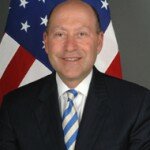Maclean’s publisher Ken Whyte has a Q & A with Canada’s prime minister about his new majority government and his foreign policy agenda.
Here is Harper on the US-Canada relationship:
“…I’m not saying it is not necessary to have good relations with a lot of people; in fact, having good relations, first and foremost, with our most critical ally, the United States, is essential to Canada’s well-being, as are our good relations or good dimensions of relations with a large number of other players. But it isn’t enough, in this day and age, to say we get along with people. We have to have a clear sense of where we want to be and where we would like our partners to go in the various challenges that are in front of them. Whether they’re economic challenges or security challenges or anything else, we better know what we’re trying to get out of this and where we’re going to align ourselves, and it’s not just good enough to say, “everybody likes us.” That is not a sufficient way to protect your interests when your interests are so deeply enmeshed with everybody else’s…”
Also:
Q: So what do we do differently?
A: First and foremost I think you see the differences in this government in terms of how we approach foreign relations. First of all, we take pretty clear stands. We take stands that we think reflect our own interests but our own interests in a way that reflects the interests of the wider community of nations, or particularly the wider interests of those nations with whom we share values and interests. Whether it’s taking strong and clear positions, for instance, at the G20 on something like a global financial regulation and a banking tax, we don’t just say, “Well, a consensus is developing for that. We’ll go along with it.” It was not in our interest. It actually happens to be bad policy as well. So we worked to oppose that particular agenda. I won’t get into specifics, but in some issues of foreign affairs or conflicts, what are the Canadian values or interests at stake? We think it’s pretty important that our long-run interests are tied somewhat to our trade, but that they’re more fundamentally tied to the kind of values we have in the world: freedom, democracy, human rights, the rule of law. We see over time—it’s not an ironclad rule—but those societies that promote those values tend to share our interests, and those that do not tend to, on occasion, if not frequently, become threats to us. We also make sure as well—and this is important—that we have the capacities. I know we’ve received some criticism for re-investing in our military, but when you’re in a dangerous world and countries are from time to time called upon to do things to deal with those dangers, if you don’t have the capacity to act you are not taken seriously. Nobody takes your views seriously unless you can contribute to solutions, and it’s very difficult to contribute to solutions unless you can contribute across the range of capabilities, up to and including military capabilities. I think if you look back—I think Hugh Segal’s written quite eloquently on this recently—Canada’s been at its most influential when it’s actually had a range of capabilities, so we’ve made sure we have capabilities.
Q: And when it’s actually been using them.
A: And when it’s been using them. If capabilities are just in the freezer all the time then they’re not really capabilities, right?
The full article is here.
***
Twitter/luizachsavage

